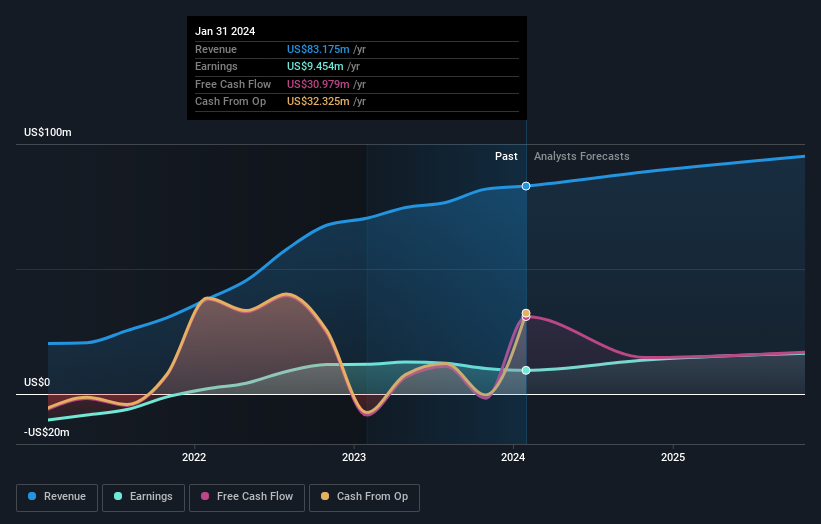Currency Exchange International, Corp. (TSE:CXI) last week reported its latest first-quarter results, which makes it a good time for investors to dive in and see if the business is performing in line with expectations. Statutory earnings per share fell badly short of expectations, coming in at US$0.13, some 50% below analyst forecasts, although revenues were okay, approximately in line with analyst estimates at US$18m. This is an important time for investors, as they can track a company’s performance in its report, look at what expert is forecasting for next year, and see if there has been any change to expectations for the business. We thought readers would find it interesting to see the analyst latest (statutory) post-earnings forecasts for next year.
View our latest analysis for Currency Exchange International


Taking into account the latest results, the current consensus from Currency Exchange International’s solitary analyst is for revenues of US$88.9m in 2024. This would reflect an okay 6.9% increase on its revenue over the past 12 months. Per-share earnings are expected to surge 38% to US$2.03. Yet prior to the latest earnings, the analyst had been anticipated revenues of US$89.8m and earnings per share (EPS) of US$2.15 in 2024. The analyst seem to have become a little more negative on the business after the latest results, given the minor downgrade to their earnings per share numbers for next year.
It might be a surprise to learn that the consensus price target was broadly unchanged at CA$31.03, with the analyst clearly implying that the forecast decline in earnings is not expected to have much of an impact on valuation.
Taking a look at the bigger picture now, one of the ways we can understand these forecasts is to see how they compare to both past performance and industry growth estimates. We would highlight that Currency Exchange International’s revenue growth is expected to slow, with the forecast 9.3% annualised growth rate until the end of 2024 being well below the historical 20% p.a. growth over the last five years. By way of comparison, the other companies in this industry with analyst coverage are forecast to grow their revenue at 12% per year. Factoring in the forecast slowdown in growth, it seems obvious that Currency Exchange International is also expected to grow slower than other industry participants.
The Bottom Line
The most important thing to take away is that the analyst downgraded their earnings per share estimates, showing that there has been a clear decline in sentiment following these results. Fortunately, the analyst also reconfirmed their revenue estimates, suggesting that it’s tracking in line with expectations. Although our data does suggest that Currency Exchange International’s revenue is expected to perform worse than the wider industry. There was no real change to the consensus price target, suggesting that the intrinsic value of the business has not undergone any major changes with the latest estimates.
Following on from that line of thought, we think that the long-term prospects of the business are much more relevant than next year’s earnings. We have analyst estimates for Currency Exchange International going out as far as 2025, and you can see them free on our platform here.
It is also worth noting that we have found 1 warning sign for Currency Exchange International that you need to take into consideration.
Have feedback on this article? Concerned about the content? Get in touch with us directly. Alternatively, email editorial-team (at) simplywallst.com.
This article by Simply Wall St is general in nature. We provide commentary based on historical data and analyst forecasts only using an unbiased methodology and our articles are not intended to be financial advice. It does not constitute a recommendation to buy or sell any stock, and does not take account of your objectives, or your financial situation. We aim to bring you long-term focused analysis driven by fundamental data. Note that our analysis may not factor in the latest price-sensitive company announcements or qualitative material. Simply Wall St has no position in any stocks mentioned.

















